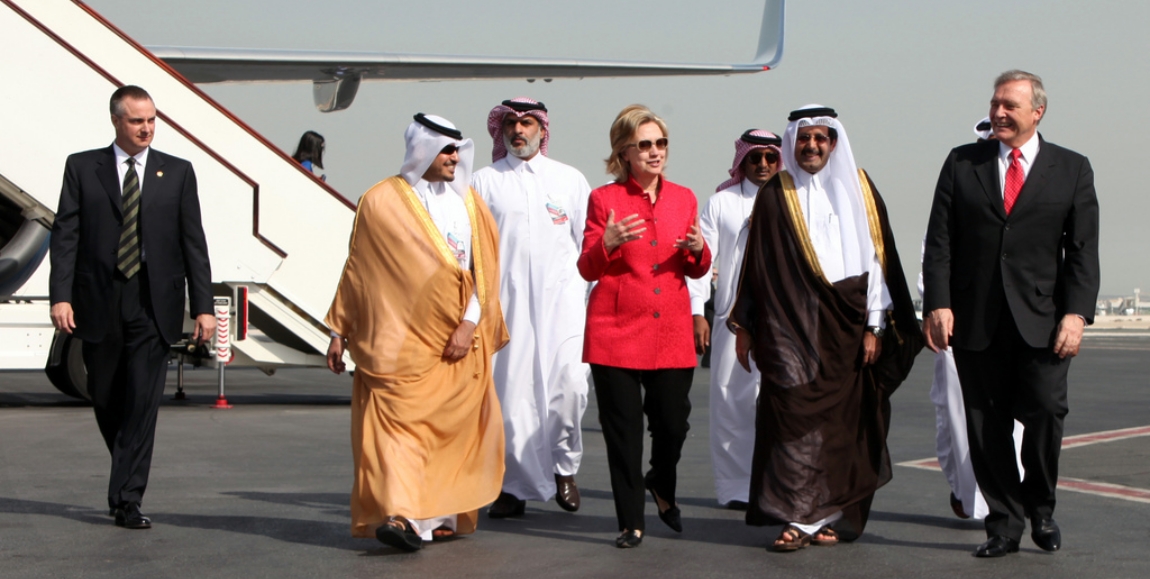Much of the coverage of the Gulf-Qatar crisis has focused on Qatar as a two faced Janus involved in everyone’s business but loyal to none. Journalist Jassim Kunji says Qatar’s multifaceted foreign policy isn’t the cause of the split with Saudi, Bahrain, and the United Arab Emirates (UAE) – rather – it was born of it.
As the de facto blockade of Qatar by its neighbours and fellow Gulf Cooperation Council (GCC) members Saudi, the UAE, and Bahrain, (abetted by Egypt and a number of other countries that depend on them for cash) continues, many international observers are still scratching their heads trying to figure out what this is all about.
The official narrative of the current crisis in the GCC from the Saudi-UAE side goes like this: “Qatar supports terrorism, is too cozy with Iran, and tries to destabilise its neighbours.†Of course, many of these countries’ own people don’t believe this narrative, with it is obvious logical inconsistencies (which is probably why they had to warn them of jail time if they express sympathy with Qatar), let alone the rest of the world.
A lot of the coverage of the crisis portrays Qatar as having out-sized ambitions, a two faced Janus involved in everyone’s business but loyal to none.
But Qatar’s multifaceted foreign policy isn’t the cause of the split with Saudi, Bahrain, and the UAE- rather; it was born of it.
Qatar was locked in land disputes with Saudi Arabia and Bahrain since before its existence as an independent country.
In the country’s early years, Qatar’s ruler Khalifa Al Thani, largely followed Saudi Arabia’s lead and had little regional influence.
But in the 1990s two events occurred that would change the relationship in a massive way.
In 1990, Iraq, reeling from its war with Iran and in desperate need of finances to rebuild, was angered by Kuwait exceeding its OPEC quota of oil exports, thereby depressing the price, and Kuwait’s use of the Rumaila oil field. Thinking it had a green light from the US, Iraq invaded Kuwait.
The invasion reinforced Qatari fears that the same could happen to it: a tiny nation with massive mineral wealth, invaded by a much larger neighbour in need of cash, or annoyed by its actions. At the time, Kuwait had much more global recognition than Qatar. If an invasion occurred, would the world care enough to save Qatar?
Qatar and Saudi Arabia both took part in the coalition to liberate Kuwait, but afterwards tensions were high. In 1992, Saudi troops attacked a Qatari border post, killing two Qataris and imprisoning a third.
When Hamad bin Khalifa Al Thani deposed his father – the Emir of Qatar – in a bloodless coup in 1995, the more independent-minded new Emir of Qatar angered his Gulf neighbours. In February 1996, an attempted countercoup to reinstall Sheikh was foiled – at the time observers said it was clearly backed by Saudi Arabia, the UAE, and Bahrain.
In response, Sheikh Hamad pursued warmer ties with Iraq, Iran, and even Israel. Later in the year, Al Jazeera opened. The goal was to put Qatar on the map, to build enough alliances and recognition that the country could be sure someone would step in if it was under threat. The country was newly cash-flush once its massive natural gas reserves began export in 1997, and with it came a greater opportunity for influence across the world.
The move of American army operations from Saudi Arabia to the American Air Base in Al Udeid in 2003 was a major development in that strategy, but even then, Qatar knew not to depend too much on one ally.
Many in the US were angered by Al Jazeera’s critical coverage of the invasion of Iraq, and the US army bombed Al Jazeera’s Baghdad bureau, killing journalist Tariq Ayyoub and killing two others.
Qatar also had to keep at least a cordial relationship with Iran. The source of its wealth, the North Dome natural gas field, lies between the two countries and is shared by them.
When the Arab Spring rolled around, Qatar sensed a unique opportunity. By backing revolutions across the Arab world, Qatar hoped for a new generation of friendly governments, with deeper legitimacy than their dictatorial predecessors.
In the end, many of those revolutions descended into civil war, or were reversed by reactionary forces. Analysts said that Qatar had bet and lost – but as always, Qatar hedged its bets.
Now that Saudi Arabia, the UAE, and Bahrain have made possibly their most aggressive moves against Qatar ever, it is finally time to see if it has done enough.
Jassim Kunji is a journalist and filmmaker based in Doha, Qatar
The views expressed in this article are the author’s own and do not necessarily reflect The Daily Vox’s editorial policy.









